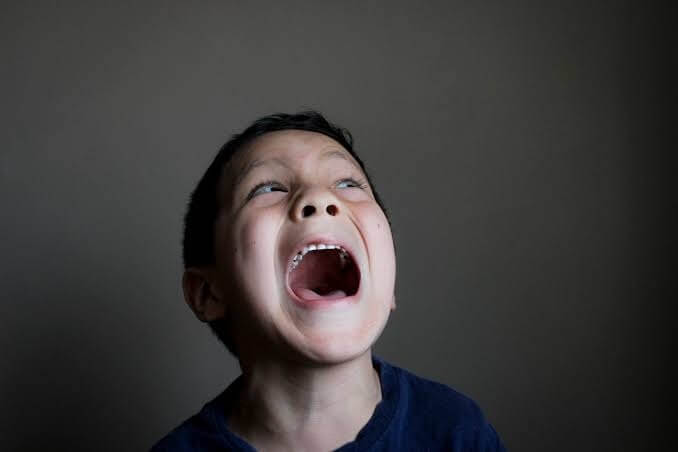Picture this: You’re in the middle of a peaceful afternoon, perhaps enjoying a quiet cup of coffee, when suddenly the air splits with the sound of your child’s piercing screams. Your heart races, your shoulders tense, and that familiar knot forms in your stomach. If you’re nodding along, you’re definitely not alone in this parenting journey. Child screaming is one of those universal experiences that connects parents across cultures, neighborhoods, and playgrounds worldwide.
Every parent has been there – standing in the grocery store while their little one unleashes their vocal cords, feeling the weight of judgmental stares and wondering if they’re somehow failing at this whole parenting thing. But here’s the thing: child screaming is actually a completely normal part of childhood development, even though it can feel anything but normal when you’re in the thick of it.
The Science Behind the Screams

Before we dive into solutions, let’s understand what’s actually happening when your child screams. Think of child screaming as your child’s emergency broadcast system – it’s their way of communicating when they lack the words, emotional regulation, or coping skills to express themselves any other way.
Younger children scream when they are overwhelmed with emotion, even over things that seem small to an adult, and this happens because their brains are still developing. The prefrontal cortex, which controls emotional regulation and decision-making, isn’t fully developed until around age 25. So when your three-year-old has a meltdown over the “wrong” color cup, they’re genuinely experiencing overwhelming emotions.
Research shows that children’s brains are wired to respond intensely to frustration and disappointment. When they can’t process these big feelings, screaming becomes their outlet. It’s like a pressure valve releasing steam – not pleasant to witness, but necessary for their emotional system.
Why Does a Child Scream for No Reason?
Here’s where things get interesting – there’s actually always a reason. Even when it seems like there isn’t. Why does a child scream for no reason is probably one of the most searched questions by exhausted parents at 2 AM. The truth is, what looks like “no reason” to us adults often has a perfectly valid explanation in your child’s world.
Common triggers include:
Developmental Overwhelm: Your child’s brain is constantly processing new information, skills, and emotions. Sometimes, this mental load becomes too much, and screaming provides relief.
Physical Discomfort: Hunger, tiredness, needing to use the bathroom, or even something as simple as a clothing tag scratching their skin can trigger child screaming episodes.
Sensory Overload: Bright lights, loud noises, crowds, or even textures can overwhelm sensitive children, leading to child screaming as a way to communicate distress.
Communication Frustration: When children can’t express their needs or wants effectively, frustration builds up like steam in a kettle until it explodes in the form of screaming.
Attention Seeking: Sometimes children learn that screaming gets them the attention they crave, even if it’s negative attention.
How to Stop a Child from Screaming for No Reason
Now that we understand the “why,” let’s talk about the “how.” How to stop a child from screaming for no reason requires patience, consistency, and a toolkit of strategies that you can adapt to your child’s unique needs.

The CALM Method
Connect with your child emotionally before trying to correct the behavior. Get down to their eye level and acknowledge their feelings: “I can see you’re really upset right now.”
Assess the situation quickly. Are they hungry, tired, overstimulated, or frustrated? Address the immediate need first.
Listen with your whole body. Sometimes children need to feel heard before they can calm down. Reflect back what you’re observing: “You’re screaming because you wanted the red cup, not the blue one.”
Move forward with gentle guidance. Once the immediate crisis passes, help them learn better ways to express their needs.
Prevention Strategies
The best defense against child screaming is often a good offense. Here are some preventive measures that can reduce the likelihood of screaming episodes:
Routine and Predictability: Children thrive on knowing what comes next. Establish consistent daily routines for meals, naps, and bedtime. Use visual schedules for younger children who can’t tell time yet.
Emotional Vocabulary Building: Help your child develop words for their feelings. Read books about emotions, practice naming feelings during calm moments, and model emotional expression yourself.
Sensory Breaks: Build in quiet time throughout the day, especially for sensitive children. This might mean dimming lights, playing soft music, or providing a cozy reading nook.
Communication Alternatives: Teach your child other ways to get your attention or express needs. This might include using a special signal, tapping your arm gently, or using simple sign language.
The Autism Factor: Why Autistic Child Screaming All the Time
For families with autistic children, screaming can be even more frequent and intense. When an autistic child is screaming, it can often be a response to stress, frustration, sensory overload, or difficulty communicating their needs or emotions. Understanding why autistic child screaming all the time occurs requires recognizing that autism affects how children process sensory information and emotions.
Unique Challenges for Autistic Children
Autistic children often experience the world more intensely than neurotypical children. What might be a minor inconvenience to one child can feel catastrophic to an autistic child. Their nervous systems are frequently in a state of heightened alertness, making them more susceptible to overwhelm.
Why does my autistic child scream for no reason is a question that many parents ask, feeling desperate for answers. The reality is that autistic children often have very specific triggers that might not be immediately obvious to parents. These can include:
- Changes in routine or unexpected transitions
- Sensory sensitivities (lights, sounds, textures, smells)
- Difficulty processing language or communication
- Internal sensations like hunger or discomfort that they can’t identify or communicate
- Emotional regulation challenges that are more pronounced than in neurotypical children

How to Discipline Autistic Child for Screaming
When it comes to how to discipline autistic child for screaming, traditional discipline methods often backfire. Instead of punishment-based approaches, focus on understanding and accommodation:
Sensory Accommodations: Reducing sensory triggers and creating a calm, predictable environment can help minimize episodes of child screaming. This might include noise-canceling headphones, fidget tools, or a designated quiet space.
Communication Support: Work with speech therapists or occupational therapists to develop alternative communication methods. Some children benefit from picture cards, sign language, or communication devices.
Behavioral Strategies: To calm an autistic child who is screaming, try to distract them with grounding techniques, like asking them questions. This helps redirect their focus away from the overwhelming stimulus.
Preventive Planning: Your child may need a 5 minute, 2 minute, or 1 minute warning before there is a change of activity. These warnings help the children prepare for the transition.
When Screaming Becomes Medical: Dealing with Distress
Sometimes, children scream due to physical discomfort or medical issues. How to remove a deep splinter from a screaming child is a situation that tests every parent’s patience and problem-solving skills. When your child is in pain and screaming, it creates a challenging cycle – their distress makes it harder for you to help them, which increases their distress.
Managing Medical Situations
Stay Calm: Your child will mirror your emotional state. If you’re panicked, they’ll be more panicked. Take deep breaths and speak in a calm, reassuring voice.
Comfort First: Before attempting any medical intervention, prioritize comfort. Hold them, speak soothingly, and acknowledge their fear and pain.
Distraction Techniques: Use songs, stories, or favorite toys to redirect their attention during brief medical procedures.
Seek Help When Needed: Don’t hesitate to call your pediatrician or seek emergency care if your child’s screaming indicates serious distress or if you’re unable to manage the situation safely.
The Community Perspective: Reddit and Real Parents
The internet has become a lifeline for parents seeking support and validation. Searches like parents who let their child scream reddit often lead to forums where parents share their experiences, frustrations, and strategies. These online communities can provide valuable insights and remind isolated parents that they’re not alone in their struggles.
However, it’s important to approach online advice with discernment. While peer support is invaluable, every child is unique, and what works for one family may not work for another. Use online communities as a starting point for ideas, but always consider your child’s individual needs and consult professionals when necessary.
Building Your Toolkit: Practical Strategies
In-the-Moment Techniques
The Power of Presence: Sometimes, the best response to child screaming is simply being present. Sit nearby, breathe calmly, and wait for the storm to pass. Your calm presence can be incredibly grounding for a dysregulated child.
Validation Without Negotiation: Acknowledge their feelings without necessarily giving in to demands. “I hear that you’re upset about turning off the TV. It’s hard when fun things have to end.”
Sensory Soothing: Offer comfort items like a favorite blanket, stuffed animal, or even a cold washcloth. Some children find deep pressure (like a tight hug) calming, while others need space.
Long-term Strategies

Emotional Coaching: During calm moments, help your child develop emotional intelligence. Practice identifying feelings, discussing triggers, and brainstorming coping strategies together.
Skill Building: Teach your child practical skills for managing big emotions. This might include deep breathing, counting to ten, or using a “calm down” kit with sensory tools.
Family Agreements: Establish clear expectations and consequences for behavior. Make sure these are age-appropriate and consistently enforced by all caregivers.
The Ripple Effect: How Child Screaming Affects the Whole Family
Child screaming doesn’t just affect the child – it impacts the entire family ecosystem. Parents may feel stressed, siblings might feel scared or resentful, and the overall family dynamic can become tense. Recognizing this ripple effect is crucial for developing comprehensive solutions.
Supporting Siblings
Often, siblings of children who scream frequently can feel overlooked or develop their own behavioral issues. Make sure to:
- Acknowledge their feelings about their sibling’s behavior
- Provide one-on-one time and attention
- Teach them coping strategies for when their sibling is screaming
- Reassure them that they’re not responsible for their sibling’s behavior
Parental Self-Care
You can’t pour from an empty cup. Taking care of yourself isn’t selfish – it’s essential for effective parenting. This includes:
- Seeking support from family, friends, or professionals
- Taking breaks when possible
- Practicing stress-reduction techniques
- Maintaining perspective about the temporary nature of this phase
When to Seek Professional Help
While screaming is normal, there are times when professional intervention is warranted. Consider reaching out to your pediatrician, a child psychologist, or a behavioral specialist if:
- Screaming episodes are becoming more frequent or intense
- Your child seems to be in physical pain during episodes
- Screaming is accompanied by self-harm or aggression toward others
- The behavior is significantly impacting your family’s daily functioning
- You’re feeling overwhelmed or unable to cope
According to research, yelling can lead to outcomes comparable to physical discipline in children, so it’s crucial to address persistent screaming patterns before they become entrenched.
Moving Forward: Hope and Perspective
Remember, this phase will pass. Every child is different, and some may outgrow screaming behaviors quickly while others need more time and support. The key is maintaining consistency, patience, and unconditional love while working toward solutions.
Child screaming is one of those parenting challenges that tests our limits and forces us to grow alongside our children. It’s messy, exhausting, and sometimes embarrassing – but it’s also temporary and manageable with the right strategies and support.
As you navigate this journey, remember that seeking help is a sign of strength, not weakness. Whether it’s connecting with other parents online, consulting with professionals, or simply taking a moment to breathe during a particularly challenging day, you’re doing important work in supporting your child’s emotional development.
The screaming may be loud now, but with patience, understanding, and the right tools, you’ll help your child find their voice in more positive ways. And in the process, you’ll discover reserves of patience and love you never knew you had. After all, isn’t that what parenting is all about – growing together, one challenging moment at a time?
Take heart in knowing that countless parents have walked this path before you, and countless more will follow. You’re not alone in this journey, and with time, understanding, and the right strategies, both you and your child will emerge stronger, more connected, and better equipped to handle whatever challenges lie ahead.



